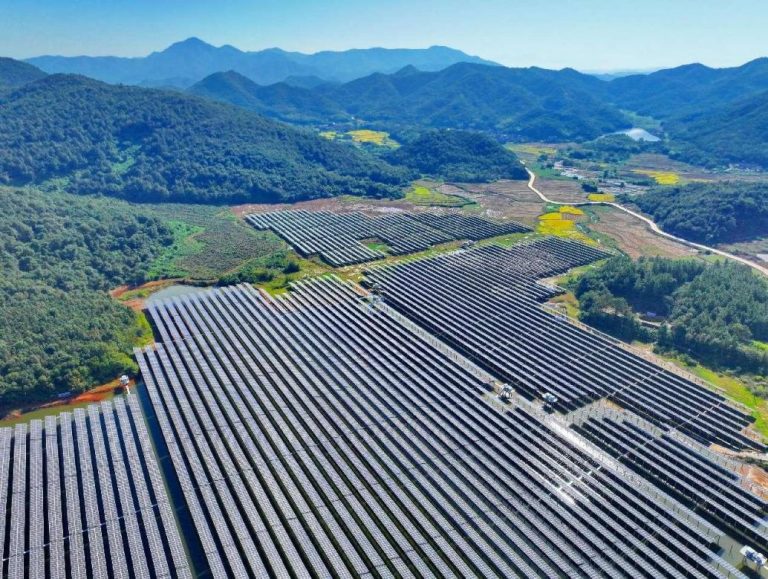
Liu Yi, China’s Ministry of Ecology and Environment(MEE) recently held a press conference to introduce the progress China has made in addressing climate change. It also released the 2023 report on China’s policies and actions to address climate change.
The report comprehensively summarizes the new progress and achievements of China’s efforts to address climate change since 2022. It also elaborates on China’s basic stance and propositions regarding the 28th session of the Conference of the Parties (COP28) to the UN Framework Convention on Climate Change, which is expected to be held in Dubai, United Arab Emirates at the end of November.
China attaches great importance to addressing climate change. According to MEE official Xia Yingxian, China has implemented a national strategy to tackle climate change, announced carbon peak and carbon neutrality goals, and put in place a “1+N” policy framework for carbon peak and carbon neutrality.
China has been promoting structural adjustment in industry, energy, and transportation, adopting a series of measures such as energy conservation and efficiency improvement, establishing and improving market mechanisms, and increasing forest carbon sinks.
As a result, positive progress has been made in addressing climate change. According to Xia, China’s carbon intensity decreased by over 51 percent in 2022 compared to 2005 levels, and the proportion of non-fossil energy consumption in total energy consumption reached 17.5 percent. The country’s ability to adapt to climate change continued to strengthen, and the Chinese society’s awareness for green and low-carbon development kept improving.
The report indicates that China is actively mitigating climate change while proactively adapting to it.
Significant progress has been made in key areas of green and low-carbon development. China has actively promoted industrial restructuring and optimization, with the sales and production of new energy vehicles ranking first globally for eight consecutive years. Non-fossil energy developed rapidly. The installed capacity of wind and photovoltaic power generation exceeded 750 million kilowatts by the end of 2022, and the clean utilization of fossil energy continuously improved.
Market mechanisms have been continuously improved. China has the world’s largest carbon emissions trading market, which started in July 2021 and currently regulates over 5 billion tons of carbon dioxide emissions annually. As of Oct. 25 this year, the cumulative trading volume of carbon emission quotas had reached 365 million tons, with a total transaction value of nearly 19.44 billion yuan ($2.67 billion).
The report points out that China actively participates in global climate change governance, deepens bilateral and multilateral cooperation mechanisms in the climate field, and has made positive progress in South-South cooperation on climate change. It has joined efforts with other countries to build a green Silk Road.
Xia said that as a responsible major developing country, China has been continuously promoting South-South cooperation on climate change through the Belt and Road Initiative (BRI). It has continuously improved the construction of the BRI International Green Development Coalition, providing support and assistance to other developing countries to the best of its ability.
As of September this year, China had signed 48 memorandums of understanding on South-South cooperation on climate change with 40 developing countries, built four low-carbon demonstration zones in cooperation with other countries, implemented 75 projects to mitigate and adapt to climate change, organized 52 capacity-building training courses, and helped train more than 2,300 officials and technicians from over 120 developing countries.
In 2021, China and African countries jointly issued the Declaration on China-Africa Cooperation on Combating Climate Change and launched a three-year action plan.
In September this year, Minister of Ecology and Environment Huang Runqiu announced the implementation of a solar power project at the inaugural Africa Climate Summit, which aims to utilize China’s advantages in the photovoltaic industry to solve lighting problems for 50,000 electricity-deprived households in Africa.
In 2022, the China-Pacific Island Countries Climate Action Cooperation Center was established to support Pacific island countries in coping with climate change. China has also conducted research on mangroves and building low-carbon schools and communities together with ASEAN countries.
China actively responded to the UN Secretary-General’s call for early warning systems for all. The Ministry of Ecology and Environment signed a trilateral cooperation agreement in May this year with the World Meteorological Organization and the China Meteorological Administration, with an aim to support the enhancement of disaster warning capabilities in other developing countries.
“China has always been a proactive advocate and pragmatic practitioner of South-South cooperation in addressing climate change. The tangible and effective results of this cooperation have received widespread praise from the international community, especially developing countries,” Xia stressed.










